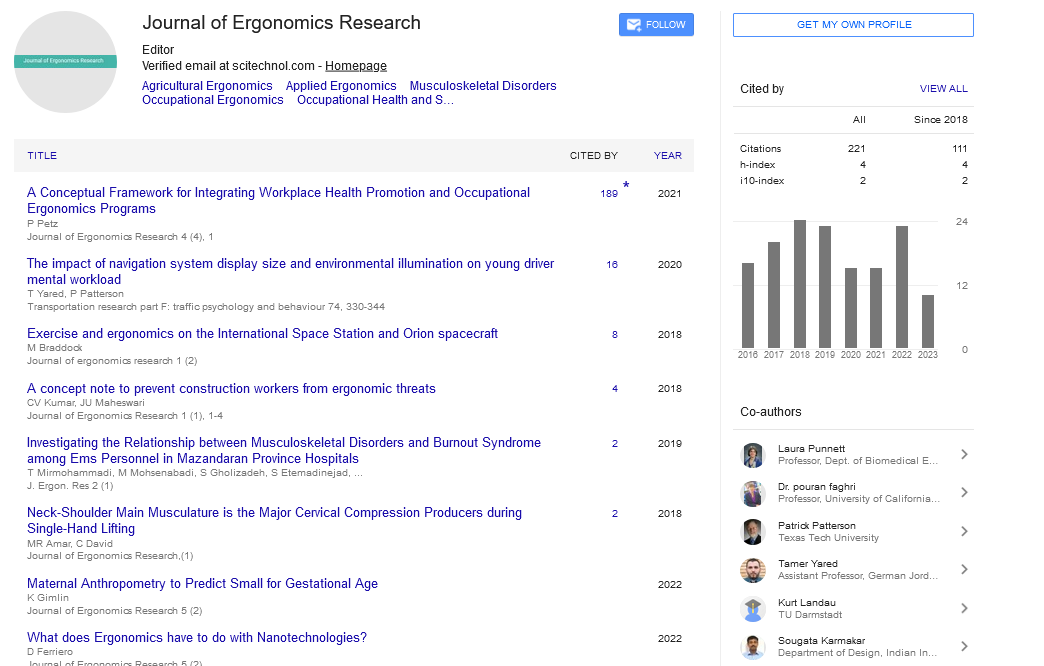Opinion Article, J Ergon Res Vol: 6 Issue: 3
Occupational Hazards of the Gig Economy: A Closer Look at Precarious Employment
George Laine*
1Department of Management, Monash University, Australia
*Corresponding Author: George Laine,
Department of Management, Monash
University, Australia
E-mail: lainegeorge2@gmail.com
Received date: 30 August, 2023, Manuscript No. JEOR-23-117748;
Editor assigned date: 01 September, 2023, PreQC No. JEOR-23-117748 (PQ);
Reviewed date: 15 September, 2023, QC No. JEOR-23-117748;
Revised date: 22 September, 2023, Manuscript No. JEOR-23-117748 (R);
Published date: 29 September, 2023 DOI: 10.4172/jeor.1000139.
Citation: Laine G (2023) Occupational Hazards of the Gig Economy: A Closer Look at Precarious Employment. J Ergon Res 6:3.
Description
The gig economy, characterized by short-term contracts and freelance work, has gained prominence in recent years. While this flexible job market offers benefits such as independence and adaptability, it is not without its downsides. Precarious employment, a significant aspect of the gig economy, presents several occupational hazards that warrant closer examination.
Precarious employment refers to work arrangements that lack security, stability, and predictability. In the gig economy, individuals often find themselves in precarious employment situations, where job tenure is brief, access to benefits is limited, and income can be inconsistent.
Occupational hazards in the gig economy
Lack of job security: One of the most prominent occupational hazards of precarious employment is the lack of job security. Gig workers often lack the protection of long-term contracts or employee status, making them vulnerable to sudden job loss or income instability. The fear of losing one's livelihood can lead to chronic stress and anxiety.
Inadequate benefits: Many gig workers do not have access to the traditional benefits provided to full-time employees, such as health insurance, retirement plans, or paid time off. This can lead to inadequate healthcare, financial insecurity, and the inability to take necessary breaks for rest and recuperation.
Income volatility: The income of gig workers can be highly variable, depending on the demand for their services. Fluctuations in income can lead to financial instability and difficulties in budgeting and planning for the future.
Long work hours: Gig workers often need to work longer hours to make ends meet, which can result in burnout and physical and mental health issues. The absence of a clear boundary between work and personal life can also exacerbate the problem.
Lack of occupational health and safety protections: In many gig work situations, especially in the gig economy's more informal sectors, workers may not have access to the same safety protections as traditional employees. This can result in increased risk of workplace accidents and injuries.
Absence of social support: Gig workers often lack the social support networks that are common in traditional workplaces. This can result in feelings of isolation, loneliness, and a lack of emotional support.
Uncertain legal status: Many gig workers face uncertainty regarding their legal status and employment rights. Clarifying issues such as classification (employee vs. independent contractor) is a complex and evolving legal challenge in the gig economy.
Lack of training and skill development: Gig workers may not have access to the same training and skill development opportunities as traditional employees. This can result in skill stagnation and limited career progression.
Physical and mental health impacts: The stress and instability associated with precarious employment can take a toll on workers' physical and mental health. Studies have shown that gig workers are at a higher risk of experiencing depression, anxiety, and other mental health issues.
Impact on occupational hazards
The gig economy's unique characteristics exacerbate these occupational hazards. It's worth noting that while some workers willingly choose gig work for its flexibility, others may be forced into it due to a lack of alternative employment opportunities. The digital nature of many gig jobs, such as app-based delivery or ride-sharing services, can lead to workers being constantly monitored and evaluated, creating a high-pressure environment that contributes to stress and burnout. The gig economy's global and 24/7 nature can also disrupt workers' sleep patterns and circadian rhythms, leading to sleep disturbances and increased risk of chronic health conditions.
Addressing the occupational hazards of precarious employment in the gig economy requires a multi-pronged approach: Governments need to adapt labor regulations to protect gig workers, ensuring they have access to benefits, job security, and occupational health and safety protections. Encouraging gig workers to form or join unions can provide them with a collective voice to negotiate for better working conditions. Expanding access to benefits like health insurance and retirement plans for gig workers can help mitigate some of the financial and health-related hazards. Recognizing and addressing the mental health challenges of gig workers is crucial. Providing resources and support for managing stress and anxiety can be beneficial. Promoting continuous skill development and offering opportunities for gig workers to expand their skillsets can enhance their employability and economic security. Platforms and companies in the gig economy can invest in technological solutions to mitigate some of the occupational hazards, such as setting limits on working hours or providing resources for health and safety.
The gig economy has brought about a fundamental shift in the world of work, offering new opportunities and challenges. While flexibility and autonomy are attractive, precarious employment within the gig economy carries several occupational hazards that can have a profound impact on workers' well-being. It is essential for policymakers, employers, and workers themselves to collaborate on addressing these issues to ensure that the gig economy is a sustainable and healthy way of working for all.
 Spanish
Spanish  Chinese
Chinese  Russian
Russian  German
German  French
French  Japanese
Japanese  Portuguese
Portuguese  Hindi
Hindi 